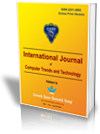Electronic Card Fraud Detection System in Nigeria Financial Institution Using Hybrid Model Approach |
||
 |

|
|
| © 2022 by IJCTT Journal | ||
| Volume-70 Issue-2 |
||
| Year of Publication : 2022 | ||
| Authors : Amaefule I. A, Chilaka U. L, Elei F. O, Ibebuogu C. C | ||
| DOI : 10.14445/22312803/IJCTT-V70I2P105 | ||
How to Cite?
Amaefule I. A, Chilaka U. L, Elei F. O, Ibebuogu C. C, "Electronic Card Fraud Detection System in Nigeria Financial Institution Using Hybrid Model Approach," International Journal of Computer Trends and Technology, vol. 70, no. 4, pp. 29-34, 2022. Crossref, https://doi.org/10.14445/22312803/IJCTT-V70I2P105
Abstract
Speed and accurate customer authentication and confirmation have become essential in the growing electronic transactions. High acceptability and expediency of e-transaction for payments has given individual comfort to customers and as well created a centre of attention for a huge number of fraudsters. From every indication, the existing preventive and detection policies were not sufficient to stop the electronic fraud issues; it is uncertain if the key authorities in the financial industry took enough measures in responding to this notification. Therefore, the need to ensure secured transactions for electronic purchases for goods and services in a virtual environment is inevitable. The purpose of this paper is to develop an electronic card transaction fraud detection system for Nigeria financial institutions using the Hidden Markov model and Neural Network that could combine proof from ongoing and past activities profile of customer usage to establish the anomaly level of each transaction. However, the incidence of e-fraud in Nigeria is also discussed.
Keywords
Electronic Payment, Internal Control, Fraud Detection System, E-fraud, Authentication.
Reference
[1] KPMG (Klynveld Peat Main Goerdeler Nigeria): Top Five (5) Fraud Trends in Nigeria’s Commercial Banks in 2016 – Part I &II. KPMG. http://www.blog.kpmgafrica.com/category/kpmg-nigeria
[2] Siklos, & Pierre., Money, Banking, and Financial Institutions. Canada in the Global Environment. Toronto: McGraw-Hill Ryerson, 40 (2001)
[3] Amaefule I.A, Onu F.U: Prevalence of Electronic Fraud in Nigeria Banking System. International Journal of Computer Trends and Technology (IJCTT) 67(3) (2019). ISSN: 2231 – 2803. https://www.ijcttjournal.org
[4] Ifeanyi Ndiomewese.: How e-fraud can be tackled to reduce losses in Nigeria. Techpoint. Ng. (2016). http://www.techpoint.ng/authors/ifeco3show
[5] Central Bank of Nigeria (CBN):. Annual Report and Statement of Accounts. Central Bank of Nigeria. (2016) https://www.cbn.gov.ng/Documents/cbnannualreports.asp
[6] NEFF: Nigeria Electronic Fraud Forum: A Changing Payments Ecosystem: The Security Challenge. NEFF. (2016) http://www.cbn.gov.ng/Out/2017/CCD/A%20CHANGING%20PAYMENTS%20ECOSYSTEM%20NeFF%202016%20Annual%20Report.pdf
[7] Deloitte Cybersecurity Concern for Nigeria, (2015). https://techcabal.com/2015/03/19/deloittes-expose-on-cyber-security-concerns
[8] NIBSS (Nigerian Interbank Settlements System): E-payment Fraud Landscape Report. (2014), https://www.nibss-plc.com.ng/reports/2014-fruad/report
[9] NDIC: Nigeria Deposit Insurance Corporation: Annual Report and statement of Account. NDIC. (2015) https://ndic.gov.ng/ndic-releases-2015-annual-report/
[10] NITDA - Nigeria Information Technology Development Agency 2015.https://nitda.gov.ng
[11] Nigerian Cyber Threat Barometer Report (2014). https://www.wolfpackrisk.com/.../nigeriancyberthreatbarometer_2014 (med_res).
[12] Kappelin, F. & Rudvall, J: Fraud Detection within Mobile Money: A Mathematical Statistics Approach. MSc Thesis Submitted to the Dept. Computer Science & Engineering Blekinge Institute of Technology, (2015). SE-37179 Karlskrona Sweden. http://www.diva-portal.org/smash/get/diva2:865559/FULLTEXT02
[13] Kovach, S., & Ruggiero, W. V. (2011): Online BankingFraud Detection Based on Local and Global Behavior ICDS The Fifth International Conference on Digital Society, (2011).
[14] R. Brause, T. Langsdorf, and M. Hepp, ?Neural Data Mining for Credit Card Fraud Detection, | Proc. IEEE Int’l Conf. Tools with Artificial Intelligence, (1999) 103-106.
[15] C. Chiu and C. Tsai, ?A Web Services-Based Collaborative Scheme for Credit Card Fraud Detection, ? Proc. IEEE Int`l Conf. e-Technology, e-Commerce and e-Service, (2004) 177-181.
[16] Sandeep Pratap Singh, Shiv Shanker P. Shukla, Nitin Rakesh and Vipin Tyagi Problem Reduction in online Payment System Using Hybrid Model, International Journal of Managing Information Technology , (2011). Doi.10.5121/ijmit_2011.3306.sourceDBLP
[17] Amanze B.C and Chinwe Onukwugha 2018 . An Enhanced Model for Bank Fraud Detection in Nigeria; International Educational Journal of Science and Engineering (IEJSE), EISSN No: 2581-6195, 1(5) (2018).
[18] Murad, U., & Pinkas, G. (2009). Unsupervised profiling for identifying superimposed fraud in proceedings of the 3rd European Conference on Principles of Data Mining and knowledge discovery, (2009) 251-266.
[19] Khan, A .P., Mahajan, V. S., Shaikh, S. H & Koli, A. B: Credit Card Fraud Detection System through Observation Probability Using Hidden Markov Model, International Journal of Thesis Projects and Dissertations (IJTPD), 1(1) (2013) 7–16.
[20] Ghosh, S., & Reilly, D. L: Credit Card Fraud Detection with a Neural- Network. Proceedings of the International Conference on System Science, (2004). 62–71. https://www.sciencedirect.com/science/article/pii/S1877050920306840
[21] Stolfo S.J., Fan D.W., Lee W., Prodromidis A.L., & Chan P.K: Credit Card Fraud Detection Using Meta-Learning: Issues and Initial Results. Proc. AAAI Workshop AI Methods in Fraud and Risk Management, (1997) 83–90.
